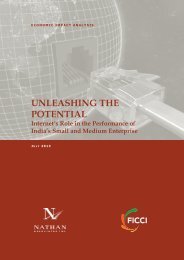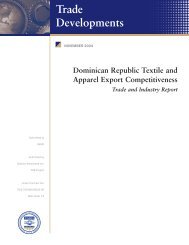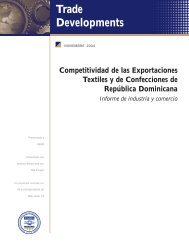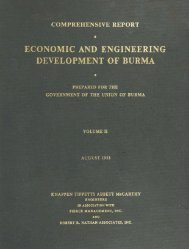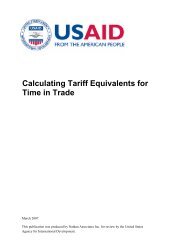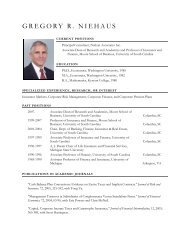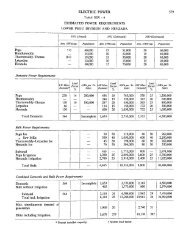Putting it to Work in Developing Countries - Nathan Associates
Putting it to Work in Developing Countries - Nathan Associates
Putting it to Work in Developing Countries - Nathan Associates
You also want an ePaper? Increase the reach of your titles
YUMPU automatically turns print PDFs into web optimized ePapers that Google loves.
BILATERAL INVESTMENT TREATIES<br />
Consist<strong>in</strong>g of specific and b<strong>in</strong>d<strong>in</strong>g rules, bilateral<br />
<strong>in</strong>vestment treaties (BIT) address <strong>in</strong>vestment<br />
issues between pairs of countries. 2 After the first<br />
BIT was adopted <strong>in</strong> 1959 the number grew<br />
steadily <strong>to</strong> 385 by the end of 1985. Once develop<strong>in</strong>g<br />
countries began conclud<strong>in</strong>g treaties w<strong>it</strong>h<br />
each other the number of BITs <strong>in</strong> force skyrocketed,<br />
and by the end of 2005 nearly 2,500 BITs<br />
had been signed. 3 Most BITs are concluded<br />
between developed and develop<strong>in</strong>g countries,<br />
but an <strong>in</strong>creas<strong>in</strong>g share (27 percent) is between<br />
develop<strong>in</strong>g countries. At least 176 countries and<br />
terr<strong>it</strong>ories have concluded such treaties. 4<br />
In<strong>it</strong>ially BITs were signed between developed<br />
and develop<strong>in</strong>g countries so the former could<br />
secure high standards of legal protection for<br />
their firms’ overseas <strong>in</strong>vestments. The Un<strong>it</strong>ed<br />
States, for example, negotiates BITs <strong>to</strong> secure<br />
<strong>in</strong>ves<strong>to</strong>r protection, <strong>to</strong> encourage adoption of<br />
market-oriented policies that treat private<br />
<strong>in</strong>vestment evenhandedly and transparently, and<br />
<strong>to</strong> promote a stable and predictable framework<br />
<strong>to</strong> lower perceived risk for <strong>in</strong>ves<strong>to</strong>rs. 5 Develop<strong>in</strong>g<br />
countries negotiate BITs <strong>to</strong> help provide a favorable<br />
climate for foreign <strong>in</strong>vestment.<br />
These treaties conta<strong>in</strong> very few specific comm<strong>it</strong>ments<br />
<strong>to</strong> development. Their value <strong>to</strong> development<br />
lies primarily <strong>in</strong> their presumed abil<strong>it</strong>y <strong>to</strong><br />
promote <strong>in</strong>vestment by provid<strong>in</strong>g a welcom<strong>in</strong>g<br />
and stable environment for foreign <strong>in</strong>vestment.<br />
BITs afford develop<strong>in</strong>g countries considerable<br />
lat<strong>it</strong>ude <strong>in</strong> apply<strong>in</strong>g national law and policy,<br />
especially w<strong>it</strong>h respect <strong>to</strong> admission of foreign<br />
<strong>in</strong>vestment, the impos<strong>it</strong>ion of operational cond<strong>it</strong>ions,<br />
and the grant<strong>in</strong>g of <strong>in</strong>centives. BITs often<br />
conta<strong>in</strong> exceptions <strong>to</strong> general pr<strong>in</strong>ciples (e.g., for<br />
balance-of-payments considerations) that address<br />
development concerns. In general, however, they<br />
do not provide measures for such matters as<br />
technology transfer, technical cooperation, or<br />
specific home-country comm<strong>it</strong>ments.<br />
Provisions of the U.S. Model BIT<br />
Each party must treat <strong>in</strong>vestments of the other as favorably as <strong>it</strong> treats domestic<br />
and third-country <strong>in</strong>vestment, from pre-establishment, <strong>to</strong> operation and f<strong>in</strong>al<br />
dispos<strong>it</strong>ion (“national treatment” and “most favored nation”).<br />
Lim<strong>it</strong>ed exceptions are as stipulated <strong>in</strong> treaty annexes.<br />
Expropriation has clear lim<strong>it</strong>s; <strong>in</strong>ves<strong>to</strong>rs are ent<strong>it</strong>led <strong>to</strong> fair compensation and have<br />
the right <strong>to</strong> transfer funds out of the country.<br />
Trade-dis<strong>to</strong>rt<strong>in</strong>g practices, such as performance requirements, <strong>in</strong>clud<strong>in</strong>g the use of<br />
local content or a requirement <strong>to</strong> export a certa<strong>in</strong> share of production, are prohib<strong>it</strong>ed.<br />
In a dispute w<strong>it</strong>h a foreign government <strong>in</strong>ves<strong>to</strong>rs have the right <strong>to</strong> <strong>in</strong>ternational<br />
arb<strong>it</strong>ration, and are not obliged <strong>to</strong> use the government’s domestic courts.<br />
Firms may hire <strong>to</strong>p managers regardless of national<strong>it</strong>y.<br />
States are prohib<strong>it</strong>ed from lower<strong>in</strong>g environmental and labor protections <strong>to</strong><br />
promote <strong>in</strong>vestment.<br />
To become effective on the U.S. side, the treaty requires approval by two-thirds of<br />
the U.S. Senate.<br />
72



